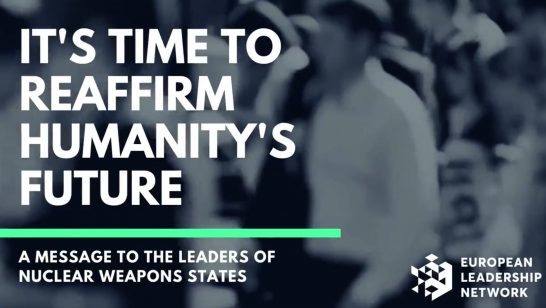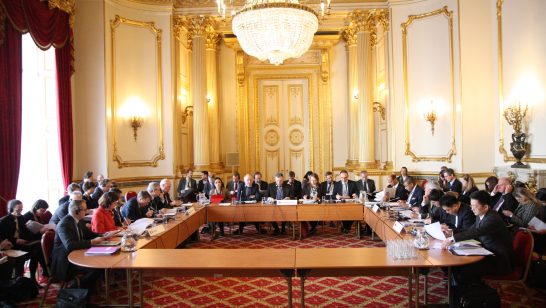
At their 16th June Geneva summit this year, Russian President Vladimir Putin and US President Joe Biden jointly reaffirmed the Reagan-Gorbachev formula that “a nuclear war cannot be won and must never be fought”. Because China had already endorsed the formula, France and the United Kingdom are now the only two countries standing in the way of P5 agreement on the statement.
Taken literally, the 1985 Reagan-Gorbachev formula is trivial. But from a non-nuclear weapon state perspective, French and British opposition to a joint P5 declaration reaffirming the principle is an anachronism and an indication of how disconnected “strategic thinking” in some nuclear weapon states has become from the NPT mainstream.
Paris and London seem to be aware that their arguments against a P5 endorsement of the Reagan-Gorbachev statement would not go down well with the broader NPT community. As a result, they are reluctant to defend publicly their reservations. But behind closed doors and in track 2.0 discussions, officials and experts from London and Paris argue that a confirmation of the statement would be dangerous because it undercuts the credibility of their deterrence postures, or, at best, it is meaningless because China and Russia are not to be trusted.
Why the Reagan-Gorbachev statement is important for non-nuclear weapon states
It can be assumed that France and the UK would be willing to sign on to the “a nuclear war must never be fought” part of the Reagan-Gorbachev formula. After all, they pledged as parties of the NPT “to make every effort to avert the danger of such a war.”
Smaller nuclear powers, like France and the UK, cannot hope to “prevail” in nuclear conflict by “conventionalizing” nuclear warfare. Thus, they can only “win” a nuclear war by assuring escalation dominance, for example, by credibly signalling intent to escalate with nuclear weapons before and during a military conflict. For most non-nuclear weapon states, this kind of thinking is precisely what makes P5 agreement on the Reagan-Gorbachev important. The exception that confirms the rule is that some non-nuclear allies of nuclear weapon states buy into the escalation dominance logic. But many of these countries have been socialized to think like nuclear weapon states, for example under NATO nuclear sharing arrangements.
For most non-nuclear weapon states though, the idea of “winning” a war with nuclear weapons is anathema to the idea of “responsible” behaviour of nuclear weapon states. Oliver Meier
For most non-nuclear weapon states though, the idea of “winning” a war with nuclear weapons is anathema to the idea of “responsible” behaviour of nuclear weapon states. To them, the notion of using nuclear weapons as normal means of warfare among nuclear powers is irresponsible because such a conflict could and probably would quickly escalate to an all-out nuclear exchange, affecting both nuclear and non-nuclear states. If nuclear weapons were to be used as a tool to compel others, this would be both dangerous as well as a blatant abuse of the nuclear weapon states’ privileged status under the NPT.
There are other reasons why non-nuclear weapon states view a P5 commitment to the Reagan-Gorbachev statement as important. P5 disunity on the question of whether a nuclear war can be “won” may provide political excuses for India and China to move away from their no-first-use policies. Both countries may want to do so to ensure “escalation dominance” in conflicts with adversaries.
A clear confirmation that a nuclear war cannot be won would also undercut the rationale for modernization programs aimed at improving nuclear warfighting capabilities. The twelve member states of the Stockholm Initiative and other non-nuclear weapon states also see an endorsement of the Reagan-Gorbachev formula as part and parcel of the nuclear risk reduction agenda for the 10th NPT.
A P5 agreement on the statement could also pave the way for a more meaningful dialogue on risk reduction and global strategic talks among the NPT nuclear weapons, something that non-nuclear weapon states would value and that Paris appears to be interested in.
Why the nuclear weapon states need to move beyond the Reagan-Gorbachev statement
Because of these and other reasons, non-nuclear weapon states at the 2010 NPT Review Conference successfully pushed for an agreement that commits all states “to further diminish the role and significance of nuclear weapons in all military and security concepts, doctrines and policies”.
For non-nuclear weapon states, an endorsement by the P5 of the Reagan-Gorbachev formula is a necessary – but not a sufficient – step that nuclear weapon states must take to show their willingness to reduce the salience of nuclear weapons. Vice versa, nuclear weapon states may fear that by signing onto the statement, they would give non-nuclear weapon states a “finger”, which may lead to them asking for the “whole arm” of more meaningful measures to decrease reliance on nuclear weapons. This kind of logic would impede any gradual progress on the reduction of the role of nuclear weapons.
Further steps by the nuclear weapon states to live up to that commitment would include an agreement by the P5 that the sole purpose of nuclear weapons is to deter a nuclear attack. A commitment not to use nuclear weapons first would be an even more significant measure to reduce the salience of nuclear weapons. Non-nuclear weapon states have also pushed the nuclear weapon states for legally-binding assurances not to use or threaten the use of nuclear weapons against non-nuclear weapon states.
The fundamental reason why many non-nuclear weapon states still find the Reagan Gorbachev formula important was articulated by Ronald Reagan himself. Oliver Meier
The fundamental reason why many non-nuclear weapon states still find the Reagan Gorbachev formula important was articulated by Ronald Reagan himself. In his 1984 State of the Union speech, addressing the Soviet people directly, the US President said: “There is only one sane policy, for your country and mine, to preserve our civilization in this modern age: A nuclear war cannot be won and must never be fought. The only value in our two nations possessing nuclear weapons is to make sure they will never be used. But then would it not be better to do away with them entirely?”
This logic places the commonplace statement that “a nuclear cannot be won and must never be fought” squarely in the context of complete nuclear disarmament. That may be the real reason why a reaffirmation of the statement matters so much to non-nuclear weapon states – and why some nuclear weapon states resist it.
The opinions articulated above represent the views of the author(s) and do not necessarily reflect the position of the European Leadership Network or any of its members. The ELN’s aim is to encourage debates that will help develop Europe’s capacity to address the pressing foreign, defence, and security policy challenges of our time.
Image: Flickr, United Nations Photo



